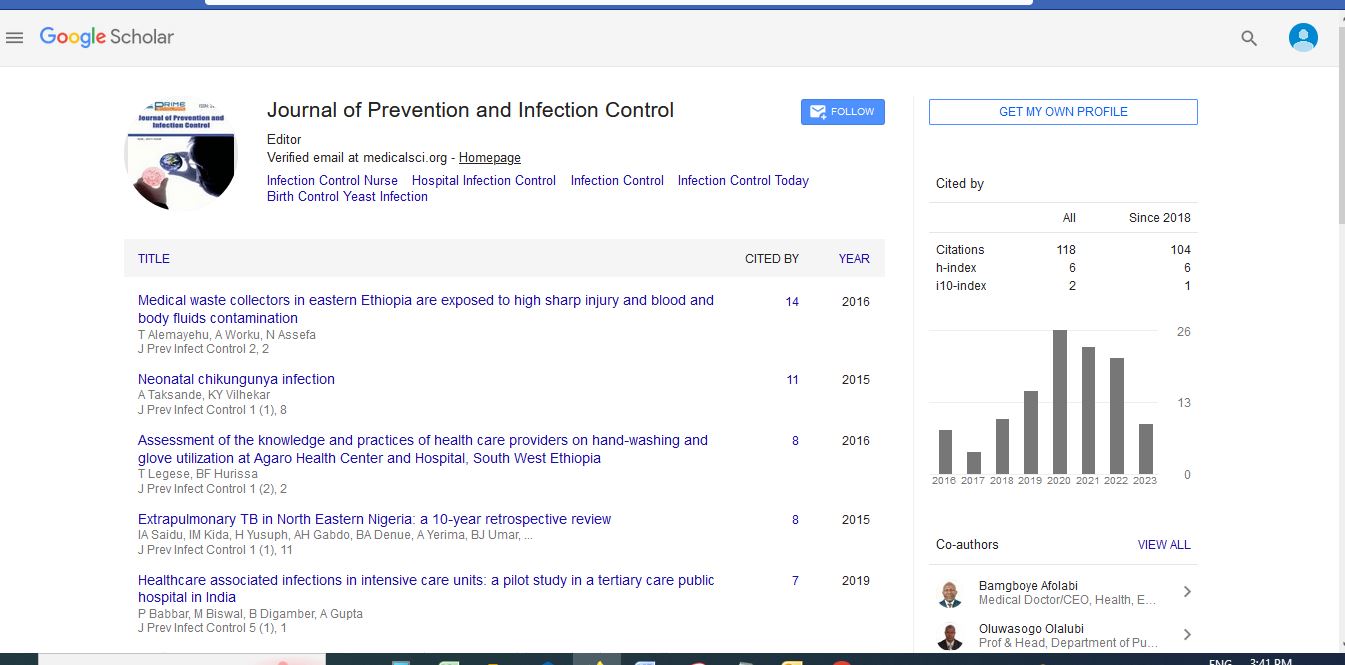Commentary - (2024) Volume 10, Issue 1
Sanitation: Building Health and Dignity Through Clean Environments
Jing Liu*
Department of Medical Science, East China Normal University, China
*Correspondence:
Jing Liu,
Department of Medical Science, East China Normal University,
China,
Email:
Received: 28-Feb-2024, Manuscript No. IPJPIC-24-20040 ;
Editor assigned: 01-Mar-2024, Pre QC No. IPJPIC-24-20040 (PQ);
Reviewed: 15-Mar-2024, QC No. IPJPIC-24-20040 ;
Revised: 20-Mar-2024, Manuscript No. IPJPIC-24-20040 (R);
Published:
27-Mar-2024, DOI: 10.36648/2471-9668-10.1.06
Description
Sanitation, often referred to as the forgotten foundation of public
health, is a cornerstone of human well-being, essential for preventing
disease, promoting dignity, and supporting sustainable
development. From access to clean water and proper waste disposal
to hygiene education and sanitation infrastructure, effective
sanitation practices play a pivotal role in safeguarding health and
ensuring a better quality of life for individuals and communities
worldwide. This article delves into the significance of sanitation,
its multifaceted components, and its profound impact on public
health and human dignity. At its core, sanitation encompasses a
range of measures and interventions aimed at promoting clean
and hygienic living environments and preventing the spread of
infectious diseases. Access to safe drinking water, adequate sanitation
facilities, and proper hygiene practices are fundamental
human rights recognized by the United Nations and essential
prerequisites for health and well-being. Yet, millions of people
around the world still lack access to basic sanitation services, putting
them at risk of waterborne diseases, diarrheal illnesses, and
other preventable health problems. Clean water and improved
sanitation are essential for preventing waterborne diseases such
as cholera, typhoid fever, and dysentery, which continue to pose
significant public health challenges, particularly in low- and middle-
income countries with limited access to safe drinking water
and sanitation facilities. Moreover, sanitation plays a critical role
in reducing the burden of neglected tropical diseases (NTDs),
which disproportionately affect the poorest and most marginalized
communities in tropical and subtropical regions. Diseases
such as schistosomiasis, soil-transmitted helminthiasis, and trachoma
are closely linked to inadequate sanitation, poor hygiene,
and lack of access to clean water, perpetuating cycles of poverty
and ill-health in affected populations. In addition to its role in
preventing disease, sanitation is essential for promoting human
dignity and social inclusion, particularly for women and girls who
bear the disproportionate burden of water collection and sanitation-
related tasks in many parts of the world. Access to safe
and private sanitation facilities, including toilets and latrines, can
empower women and girls to manage their menstrual hygiene
with dignity, attend school regularly, and participate fully in social
and economic activities. Furthermore, sanitation is integral
to sustainable development and environmental conservation, as
poor sanitation practices can lead to pollution of water sources,
soil degradation, and ecosystem disruption. Inadequate waste
management and open defecation contribute to environmental
contamination and the transmission of diseases, posing risks to
human health and ecosystem integrity. Addressing the global
sanitation crisis requires concerted efforts at the local, national,
and international levels to improve access to safe drinking water,
sanitation facilities, and hygiene education for all. The United Nations
Sustainable Development Goals (SDGs) include targets to
achieve universal access to water and sanitation by 2030, recognizing
the essential role of sanitation in achieving health, equity,
and sustainability. In conclusion, sanitation is a fundamental human
right and a prerequisite for health, dignity, and sustainable
development. By investing in sanitation infrastructure, promoting
hygiene education, and empowering communities to adopt
safe sanitation practices, we can create clean and healthy environments
that support the well-being and prosperity of present
and future generations.
Acknowledgement
None.
Conflict Of Interest
None.
Citation: Liu J (2024) Sanitation: Building Health and Dignity through Clean Environments. J Prevent Infect Control. 10:06.
Copyright: © 2024 Liu J. This is an open-access article distributed under the terms of the Creative Commons Attribution License, which permits unrestricted use, distribution, and reproduction in any medium, provided the original author and source are credited.

